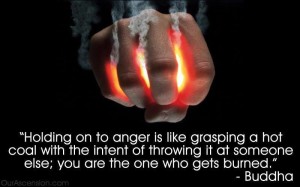Negative emotions can be very useful, as they show us when something is wrong or not acceptable. The presence of emotions is part of being human, and we should be using our emotions (positive and negative) as lessons for life and stepping stones for developing new strategies.
However, the issue with negative emotions is that people can get stuck in them, which isn’t good. In the moment they are useful, but to hold on to them isn’t. What would be useful is to learn what you need to learn from the emotion, retain the memory for the future, but let go of the negative emotion.
Holding on to negative emotions and conflicts (often unconsciously, so you’re not even aware) can prevent you from moving forward. Additionally, holding on to or bottling up negative emotions has been shown to affect our body’s health as well (including the increased risk of cancer, heart disease, bowel problems).
Here are some examples:
Anger (including fury, rage, resentment): It does make you take some action (although not always the correct action!), and then we often feel a number of other negative emotions such as guilt, shame, regret, sadness. Additionally, some people may repress anger if it was not the right situation to express their anger at the time. These bottled emotions could show as out of control behaviour.
Sadness (including regret, sorrow): These negative emotions can spiral out of control into deep unhappiness, stopping our ability to recover from stressful events and causing low self-esteem and self-confidence.
Fear (including anxiety, panic, terror): Fear often keeps people stuck – scared of not being liked or good enough, to act, change things, say “no”, the future, debt, success, failure, illness or death, being alone – and many, many more. Many fears are irrational (as in phobias). Rather than try and control it or face it, it’s better to let go of fear. You will then find the power you have inside to do the things you really want to do.
Guilt (including remorse, shame, blame – of yourself and others): Guilt connects us forever with a mistake we’ve made, although never actually stops us repeating the old mistake. This can them make us feel inferior, not good enough or worthy of love, compassion or acceptance. We need guilt to know when we should feel responsible for a wrong action and stop us from being capable of horrendous deeds, but we don’t need to keep hold of old guilt. To change our behaviour and stop us repeating mistakes that we feel guilty about, we need to recognise it and learn from it.
Hurt (such as wounded, heartbroken): We have all been hurt at some time in our life. When we’re subjected to behaviours that we don’t deserve, it can take us by surprise and hit us like a ton of bricks. But holding on to it, or “stuffing it down” can make us feel powerless and stuck in our suffering. If we allow others to have power over us by holding onto the hurt for years, we remain their victims and therefore unhappy and unfulfilled. And the one who caused the hurt could have moved on without ever understanding their impact. The people who are happiest will have also suffered hurt, but have recognised it, accepted it has happened and then decided that to no longer put up with it.
There are often pressures to deny our feelings and not express our emotions, and if you’re not constantly happy there must be something wrong with you. However, negative emotions are useful in the moment, but not when they’re held on to. The presence of unresolved negative emotions can make the difference between a fulfilled life or a miserable one.
So, if you are holding on to negative emotions, you can ask yourself – do you want to do something about it?
Applied Neuroscience, Neuro-Linguistic Programming (NLP) and Time Line Therapy™are techniques which can help you discover your fears, learn the lessons you need to learn from them, and let them go so that you can fulfil your potential.
Contact us if you would like to discuss how Personal Coaching could help you achieve your goals.

